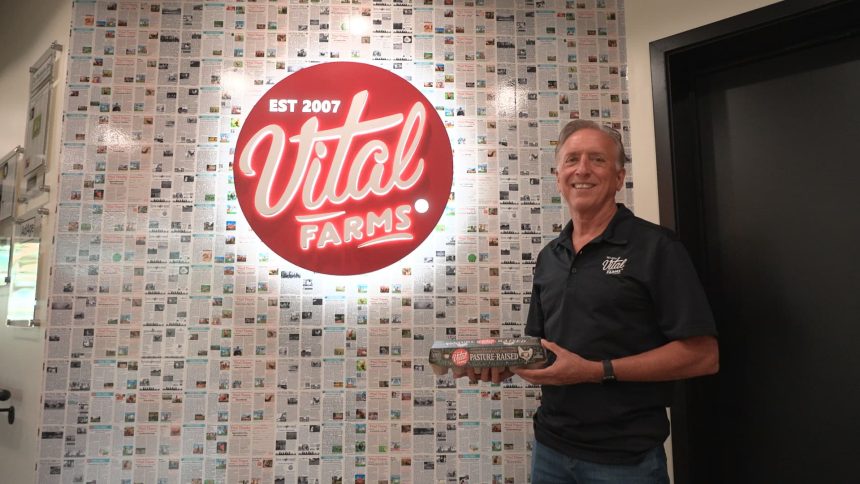Matt O’Hayer estimates he’s started “about 50 businesses,” from carpet cleaning to chartering sailboats.
His biggest success came when he stopped “trying to get rich” and started a company he believed in — one with a “deeper purpose,” he says. That’s Vital Farms, which says it’s the nation’s largest producer of pasture-raised eggs.
The business works with more than 300 family farms across the country, and can process up to six million eggs per day. It brought in $362.1 million in net revenue last year, marketing itself to customers willing to pay $6 to $10 — multiple times the current national average of $2.04 — for a carton of a dozen ethically produced eggs.
O’Hayer launched Vital Farms in 2007 with 20 Rhode Island Red hens on a 27-acre farm near Austin, Texas. His goal was twofold: Raise egg-laying hens in a more humane environment than was typical in the U.S., and teach other farmers to do the same.
Vital Farms, which also sells butter, is now valued at $452.17 million, after going public in 2020, and is on track to bring in $465 million in revenue this year, according to company projections.
“I think we’ve shocked a lot of the marketplace, to think that people would be willing to pay extra for eggs,” O’Hayer, 68, says, adding: “It shows that … people really care about what they eat and where it comes from.”
Inspired by ‘conscious capitalism’
O’Hayer’s first “sizable” business, which he began at age 20, was a carpet cleaning and janitorial services company in Houston. Other ventures have included a barter exchange service, travel company and sailboat vacation charter service.
In the 1980s, he and his ex-wife bought and tried to run a small farm. Their hens, which used to live in cages, “wouldn’t move,” O’Hayer says. “They just sat around, and I had to bring food to them.”
Vital Farms eggs can cost anywhere from $6 to $10 per dozen, multiple times the national average.
CNBC Make It
Somewhere around the same time, in 1984, O’Hayer met Whole Foods Market co-founder John Mackey. The two businessmen hit it off, sparking a long friendship, says O’Hayer. And when Mackey wrote a blog post in 2006 about “conscious capitalism,” which seeks a balance between profitability and social responsibility, O’Hayer felt inspired.
He started researching business ideas with a “deeper purpose,” and found himself returning to the egg industry, where an estimated 90% of the world’s egg-producing chickens live in cages. Those are “the most tortured farm animal in the world,” O’Hayer says.
He bought the 27-acre farm in Austin for $250,000, and got to work.
From Whole Foods to 24,000 stores
It took two years for Vital Farms to turn its first operating profit. O’Hayer spent most of that time overcoming the mistakes of a novice farmer.
The company’s chickens roam across a minimum of 108 square feet of farmland each day, foraging for natural grasses and insects. That’s not enough, O’Hayer discovered: The hens required additional feed, made from corn and unprocessed soybean meal, to ensure high egg production rates.
Once you get eggs, you need to sell them. Without a customer base, Vital Farms ended up donating its eggs to a local food bank multiple times, says O’Hayer.
In 2009, the company landed its “first big customer” — Whole Foods. Over eight slow years, the grocer expanded Vital Farms from Midwest stores to the rest of the country, which O’Hayer calls a “slog.”
“The way we expanded was not through relationships, necessarily, but through the fact that our eggs were selling,” he says.
When you treat them right, not only is it better for the hen, but it actually turns out that they lay a much better egg.
Matt O’Hayer
Founder, Vital Farms
Part of the popularity stems from Vital Farms’ mission. More than three-quarters of consumers say they care about the welfare of animals raised for food, according to a 2018 survey by the American Society for the Prevention of Cruelty to Animals.
But that wasn’t the only reason consumers bought in, O’Hayer says.
“It was really the taste and flavor of the egg that really drove our sales early on,” he says. “It’s a fortunate coincidence in laying hens that when you treat them right … it actually turns out that they lay a much better egg.”
As sales picked up, Vital Farms expanded to retailers including Albertsons, Kroger, Publix, Target and Walmart. Today, the brand appears in more than 24,000 stores nationwide.
Maintaining standards
O’Hayer’s goal was always to partner with other farms: More eggs means higher sales.
It also creates a challenge. A lot of farms don’t meet Vital Farms’ specifications for humane conditions, from animal welfare and safety requirements to geographical features like tree coverage, a lack of standing water and outdoor grazing space.
Those factors are expensive, and Vital Farms has to convince farmers that the costs are worthwhile.
“We work really hard on the front end of a relationship with a farmer to help make sure that that farmer … is going to be less prone to maybe taking the kind of shortcut that results in an animal not being treated as as we would like it to be,” says Russell Diez-Canseco, who took over as Vital Farms CEO from O’Hayer in 2019.
Vital Farms can process up to 6 million eggs per day at the brand’s central processing facility in Missouri.
CNBC Make It
Vital Farms’ eggs are labeled “Certified Humane” by animal welfare nonprofit Humane Farm Animal Care, and it’s among the brands recommended by the American Society for the Prevention of Cruelty to Animals (ASPCA).
It’s also being sued by People for the Ethical Treatment of Animals (PETA) and a group of consumers, who say Vital Farms’ ethical and humane branding is misleading. The lawsuit centers around industry-standard practices like trimming chickens’ beaks to ensure they don’t harm one another, and obtaining chicks from hatcheries that kill male chicks because they don’t lay eggs.
“The truth is that no matter what eggs you’re buying, [there] are some ways in which we would like to see producing those products be made better in some way,” Diez-Canseco says. “We face the same dilemma as any other egg producer does. Those are certainly not things we shy away from talking about, but they’re not things that the industry has come up with a very different alternative for today.”
Room to grow in a $14 billion market
Vital Farms’ annual sales have nearly quadrupled since first topping $100 million in 2018, outpacing every other pasture-raised egg brand in the country, according to the company.
That still only accounts for “maybe, 5% or 6% of U.S. retail sales of eggs,” Diez-Canseco says. The market’s biggest competitor, Cal-Maine — which sells under brands like Eggland’s Best and Land O’Lakes — brought in more than $3.1 billion in 2022 sales.
In total, the U.S. eggs market is valued at nearly $14 billion, according to a Research and Markets report published in July. Nearly 40% of egg production in the U.S. is controlled by a small group of large competitors, with Vital Farms not even among the top five.
I think we’ve shocked a lot of the marketplace, to think that people would be willing to pay extra for eggs.
Matt O’Hayer
Founder, Vital Farms
That makes Vital Farms “still very much the startup in that space,” says Diez-Canseco. Still, his company’s internal projections say it’ll bring in more than $1 billion in annual net revenue by 2027.
That’ll depend on convincing more farmers to spend on humane conditions, and more people to buy relatively expensive eggs.
“Our purpose is to improve the lives of people, animals and the planet through food,” says Diez-Canseco. “And there are a lot more people and a lot more animals and a lot more land in this country in front of us.”
DON’T MISS: Want to be smarter and more successful with your money, work & life? Sign up for our new newsletter!
Want to earn more and land your dream job? Join the free CNBC Make It: Your Money virtual event on Oct. 17 at 1 p.m. ET to learn how to level up your interview and negotiating skills, build your ideal career, boost your income and grow your wealth. Register for free today.
Read the full article here




